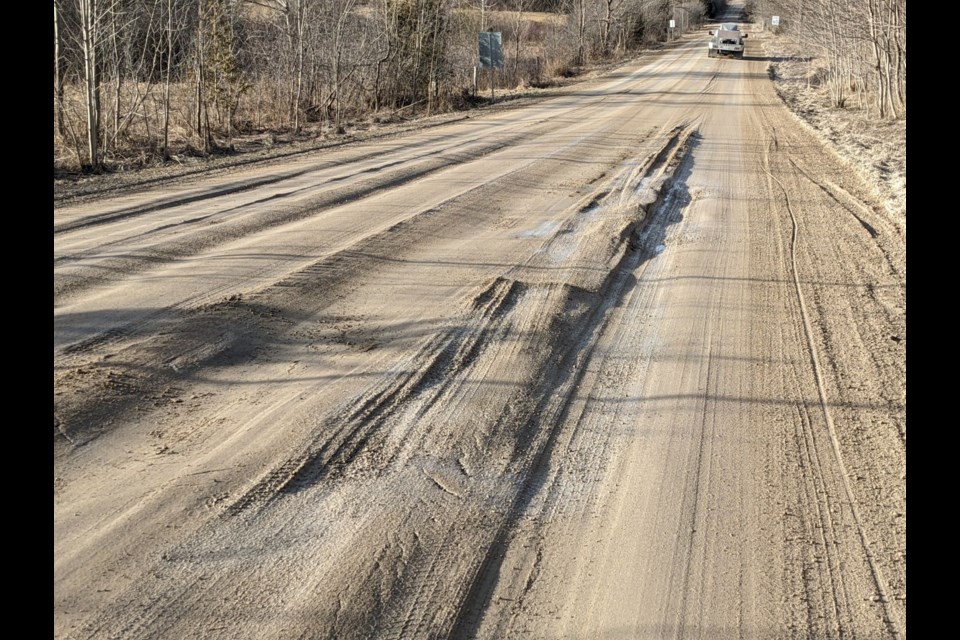PUSLINCH – Some residents living on what the township is calling an "irreparable" gravel road are worried someone is going to get seriously injured or worse before the township considers hard-surfacing it a worthy investment.
When Jeff Burdey and his family moved onto Sideroad 10 in 2020, Burdey said the state of the road was what you would expect from a gravel road – it would get beaten up during the winter but was driveable the rest of the year.
Fast forward to 2024 and Burdey said the road has deteriorated significantly and the closure of Paddock Bridge on Wellington Road 35 last year has only made things worse.
"I just worry that at some point, there's going to be a loss of life due to some sort of accident," said Burdey. "We all kind of worry about it...my neighbor across the street says she cringes because her kitchen faces towards the pond and she's worried she's gonna see somebody crash into it while looking through the window."
While he and his wife have counted tracks going into the ditch "numerous times" when the road's condition was "really poor" and "beaten up" over the last couple of years, Burdey said now that the road is "heavily grooved," once it's covered with snow and a little bit of ice, it's nearly impossible to notice the depth if not already familiar with the road's condition.
Last month, a truck crashed on Burdey's property where he usually waits for his son to get off the school bus.
"It's bad enough (the driver) went to the hospital in an ambulance. What if (he'd crashed) a little bit further by the pond?" said Burdey.
"It's one thing to not see on a paved road where you can hopefully slow down in time, assuming you're doing the speed limit, or swerve into a ditch. But it's another thing to do it on a gravel road where you have water on both sides...if you swerve, you're going right in."
The road's state was confirmed by the township's director of public works, parks and facilities Mike Fowler during a council meeting last month, who said drivers ignoring the recommended detour has "severely impacted" Sideroads 10, 20 and 25 and called the subbase and driving surfaces "irreparably damaged" and below the township's standards.
While the study included in the township's Roads Management Plan (RMP) said Sideroad 10 only saw between 200 to 400 in annual average daily traffic (AADT) when it was conducted in 2022, Fowler estimated the road currently sees "more than 2,000 vehicles a day" and said maintaining these three roads has been an ongoing issue since the bridge closed.
In addition to the "enormous growth of traffic," Fowler clarified during the meeting that staff cannot grade a road when the driving base is saturated and it's necessary to wait at least 12 hours for no precipitation before road staff can turn the road over as weather is the number one factor when grading is considered.
"We just have to sit and wait and I know that's frustrating to our residents...but if we continue to work wet granular, it will just turn into soup and you are left with a bigger mess and a bigger hazard," said Fowler.
Burdey and his neighbours aren't sure Paddock Bridge's anticipated reopening this summer will solve their problems.
"We don't have sidewalks, we don't have all this other type of (infrastructure) you'd have in the city and that's why we chose (to live in a rural area) and we're happy to be out here," said Burdey. "You would hope if a family wants to walk to the neighbours, they don't feel they have to run over to the side every time a car is coming because we're concerned that something bad will happen."
According to RMP criteria for hard surfacing a road, a gravel road qualifies for hard-surfacing if a full regrading is completed more than four times during two consecutive non-winter periods (May 1 to Nov. 1) and has an AADT of 2,000 to 4,000 vehicles a day.
The RMP said one of the reasons Sideroad 10 didn't qualify for hard-surfacing was because it was graded less than four times when the study was conducted.
A road is graded when 60 per cent of its surface has potholes.
The township did not immediately respond to questions about how one repairs/maintains an irreparable road, how often it reaches 60 per cent and whether the road is considered safe to drive on in its current condition.
When the topic of gravel road conditions came up during last month's meeting, Mayor James Seeley said he knows staff are doing a "great job" maintaining the roads despite comments from the community about their professionalism and response times for potholes and grading.
He did acknowledge that this year has been challenging for maintaining the township's gravel roads due to the "spring-like conditions" in February.
"The accusations I'm hearing are 'Why aren't you taking care of my gravel road? Why won't you pave my gravel road?' Well, it (costs) a million dollars per section (of gravel road paved)," said Seeley, during the meeting.
Using estimates based on tenders in adjacent municipalities between 2019 and 2022, the RMP said it would cost approximately $400,000 spread over eight years to apply a hard surface treatment to two kilometres of gravel road.
This doesn't include inflation, the cost of any associated improvements like ditching and road widening or any engineering and construction administration, although the RMP said historic costing for previous asphalt paving projects suggests isolated improvements/reconstruction work can add a substantial amount to the capital cost of a road surfacing project.
The township did not immediately respond to questions asking how much it costs to regrade the road and conduct daily road inspections.
An inspection of the roads affected by the bridge detour will be conducted once Paddock Bridge reopens.
Isabel Buckmaster is the Local Journalism Initiative reporter for GuelphToday. LJI is a federally-funded program



